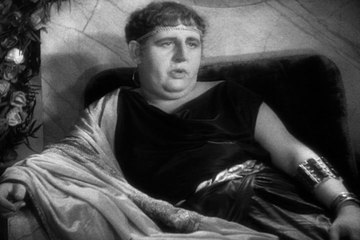Nicole talked about the opening of Civil War and the peculiar dedication to Nero.
Lucan apparently wrote the first three books of his epic before he fell out of favor with Nero, and so there’s been a lot of dispute over whether the praise of Nero at the beginning of the poem is sincere.
Even as the poem bemoans the awfulness of the Roman Civil War, Lucan says that still, the reward of Nero made all that horror worthwhile.
This is certainly bombastic praise, and conceivably sincere, but what about the next passage?
When your watch is through
and you seek the stars at last, your chosen court
of heaven will welcome you, delighting the pole.
You could hold the scepter, or you may like to mount
Phoebus’ flame-bearing chariot, range the earth—
unfazed by the change of sun—with roving fire;
whatever you please: each god will cede to you,
and nature will relinquish her right to you
to be what god you will, install your world throne.
But do not choose your seat in Arctic regions,
nor in warm skies inclined to adverse south winds:
from these your gaze on Rome would be aslant.
If you weigh on any one part of boundless space
the axle will feel the load. Keep your weight
to the middle: balance heaven.Civil War I.48-62 (tr. Matthew Fox)
Let’s look at Susanna Braund’s translation of the bolded lines:
If you press on either side of the boundless ether,
the sky will feel the weight.[Aetheris inmensi partem si presseris unam,
Sentiet axis onus.]
Even allowing for cultural differences, this line seems awfully suspicious. Lucan says that Nero is so heavy that he must be careful not to sit too far to one side in heaven or else he’ll crush the sky. Of all the possible metaphors Lucan could have used, this one seems rather inopportune. He had not fallen from favor with Nero yet, but wouldn’t it have been exactly these sorts of antics that alienated Nero in the first place?
In his essay “Is the Eulogy of Nero Ironic?” Pierre Grimal disagrees and insists this is sincere praise. He makes a weak case: he simply ignores the boldface lines above, and he quotes Tacitus as saying that Nero was young and handsome. Unfortunately, Tacitus doesn’t say this; he only says that Nero was younger and less ugly than the bald, arthritic 72 year old emperor Galba. That’s a low bar.
If Grimal has to reach that much for evidence, I distrust his thesis, and so I will stick to believing that Lucan was mocking Nero from the start. The sinister ambiguity of the final lines of the eulogy certainly leave room for interpretation:
But you’re a god to me now: and if as seer
my heart is seized by you, I’d have no need
to rouse the god who stirs up Delphi’s secrets
or to bother Bacchus to abandon Nysa—
you are enough to empower Roman poems.Civil War I.68-72 (tr. Matthew Fox)
And what a poem Nero empowers. On to more weighty (ho ho) matters next!

7 March 2012 at 21:13
The line you point out is great–and I totally missed it! I do think of it more as Lucan’s “antics,” as you put it, than something really nasty—but emperor’s are often not so fond of antics in any spirit!
I’m curious as to whether you think the “axle” in Fox’s translation (and it looks like this is more literal than Braund’s) is totally abstract or also refers to Rome. It seems to go well with the “aslant” gaze at Rome if Nero is on either side of heaven, suggesting that Nero’s choice of location for his eternal rest might have continuing effects on the empire. If he doesn’t “balance heaven,” who knows what will happen–another civil war?
8 March 2012 at 00:27
I’m really out of my depth now. It might relate to Roman astronomy and Ptolemaic spheres in which the planets moved. Each sphere in which a planet is embedded is turning on an axis. I don’t know how one would go about balancing or upsetting it though.
Or it could relate to Atlas balancing the heavens on his shoulders and the polar axis extending from earth?
Grimal suggests that the axle is the Milky Way itself and that there was some tradition identifying it as a celestial palace. Seems unlikely.
Maybe some scholar will sweep in and clear this up. Metaphorically, though, I think I agree with you: the poem paints a world so out of balance that it seems that the much-sough balance would be very difficult to attain.
And in looking at some annotations, it looks like the some anonymous tenth century commentators in the Commenta Bernensia (http://en.wikipedia.org/wiki/Commenta_Bernensia) agreed that the passage is meant to insult Nero, so I’m not alone on this one!